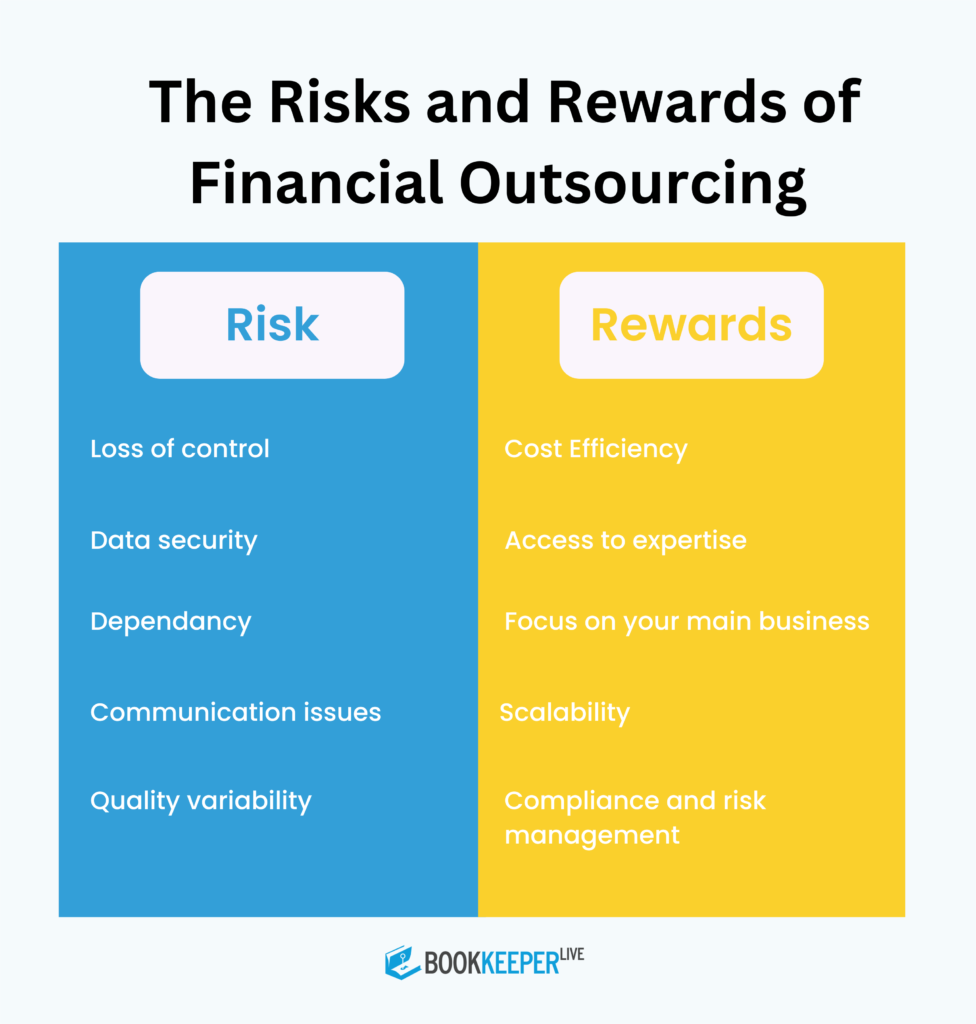
Outsourcing financial functions is becoming an increasingly popular option for companies looking to optimize their operations. This involves delegating key tasks such as bookkeeping, payroll, tax preparation, and financial reporting to third-party experts. While financial outsourcing can streamline processes and improve efficiency, it also comes with its own set of challenges. In this blog, we will explore both the risks and rewards of implementing financial outsourcing in your organization, helping you make an informed decision.
When businesses outsource their financial tasks, they give up some control over how these processes are handled. For companies that rely on having close oversight of their financial operations, this can be uncomfortable. It may become harder to get quick access to important data, keep things transparent, and make fast decisions when an outside provider is managing these tasks. As a result, there could be delays or a disconnect between the company’s goals and how their financial strategies are carried out.
One of the greatest risks in financial outsourcing is the potential for data breaches or unauthorized access to sensitive information. Financial data, including payroll, tax filings, and internal accounts, is highly sensitive and must be protected under stringent privacy regulations. If the third-party service provider lacks robust cybersecurity protocols, your company may be exposed to hacking attempts, identity theft, or fraud. Compliance with regulations such as GDPR, HIPAA, or other financial security mandates is crucial, and a breach can lead to legal ramifications and reputational damage.
Relying heavily on an external provider for key financial operations can create a dependency that may be difficult to manage in the long term. If the outsourcing partner fails to meet expectations, underperforms, or even shuts down their business, your organization could face significant operational disruptions. This risk is especially pronounced if there is no clear contingency plan or backup provider in place.
Effective communication is crucial for the success of any outsourced financial function. However, when outsourcing to a provider in a different country or time zone, communication issues can arise. Language barriers, cultural differences, and inconsistent availability can complicate daily interactions, leading to delays, misunderstandings, and errors in financial reporting. It’s vital to establish clear channels of communication from the outset to ensure that all parties remain aligned.
Although outsourcing firms typically hire skilled professionals, there can be variability in the quality of services provided. Differences in training, experience, and understanding of your business’s unique needs can lead to inconsistencies in performance. Some providers may not have the deep industry-specific knowledge required, which could result in subpar results and ultimately harm the business.

One of the most significant benefits of outsourcing financial operations is cost savings. By outsourcing, companies can reduce expenses related to hiring and retaining in-house financial teams. Costs associated with salaries, benefits, training, and office space are minimized, freeing up resources to invest in other critical areas of the business. This is especially advantageous for small and medium-sized enterprises (SMEs) that don’t require a full-time finance department but still need expert oversight.
Financial outsourcing gives businesses access to a pool of seasoned professionals who bring specialized skills and knowledge. Many outsourcing providers employ experts who stay current with evolving financial regulations, tax laws, and industry standards. This allows companies to benefit from cutting-edge practices and technological advancements without the burden of continuous in-house training and development.
Outsourcing financial tasks enables management to focus on core business activities, such as innovation, customer engagement, and market expansion. Delegating time-consuming financial functions to a third party helps streamline day-to-day operations, allowing teams to concentrate on driving growth and maximizing revenue. This strategic shift can also improve overall business efficiency and lead to better decision-making at the leadership level.
Financial outsourcing offers unparalleled flexibility, especially for businesses experiencing growth, seasonal demand, or market fluctuations. With an outsourced financial provider, companies can easily scale their financial services up or down based on their current needs. This adaptability ensures that businesses are not over-committing resources during slower periods, while still being able to meet increased demands during times of expansion.
Staying compliant with financial regulations is a top priority for businesses, and failing to do so can result in penalties, fines, or legal challenges. Outsourcing to a reliable financial service provider helps ensure that your company remains compliant with all applicable laws and industry regulations. These providers stay updated on changes in tax codes, labor laws, and reporting standards, reducing the risk of non-compliance. Additionally, many outsourcing firms have risk management protocols in place to prevent fraud and financial misconduct, further safeguarding the business.
Financial outsourcing can offer substantial rewards to organizations looking to streamline operations, reduce costs, and improve access to financial expertise. However, businesses must carefully evaluate potential risks such as loss of control, data security issues, and dependency on external providers. By partnering with a reputable and secure outsourcing firm, companies can mitigate these risks and fully leverage the benefits of outsourcing.
At BookkeeperLive, we provide comprehensive financial outsourcing services that cater to businesses of all sizes. With a focus on security, transparency, and communication, we help our clients achieve both operational efficiency and peace of mind. Whether you need expert bookkeeping, payroll management, or compliance services, our team of professionals is here to support your business every step of the way.
1. Why do businesses choose to outsource their financial functions?
Businesses often choose to outsource their financial functions to reduce costs, access specialized expertise, improve focus on core business activities, and enhance scalability.
2. How can businesses mitigate the risks associated with financial outsourcing?
Businesses can mitigate risks by carefully selecting outsourcing partners, conducting due diligence, establishing strong communication channels, and implementing robust data security measures.
3. What factors should businesses consider when negotiating outsourcing contracts?
Factors to consider include service level agreements, pricing, confidentiality clauses, dispute resolution mechanisms, and termination provisions.
BookkeeperLive provides affordable bookkeeping and accounting services tailored to your business goals.





No calls, No meetings, No spam. Get started with a free trial by filling out the form.
*NDA included for your data protection.
Copyright © 2025 BookkeeperLive. All rights reserved. Privacy Policy Terms of Use
Please visit our India site to see services designed for your country
Enter the code, fill out the form, and unlock financial clarity with a free trial.